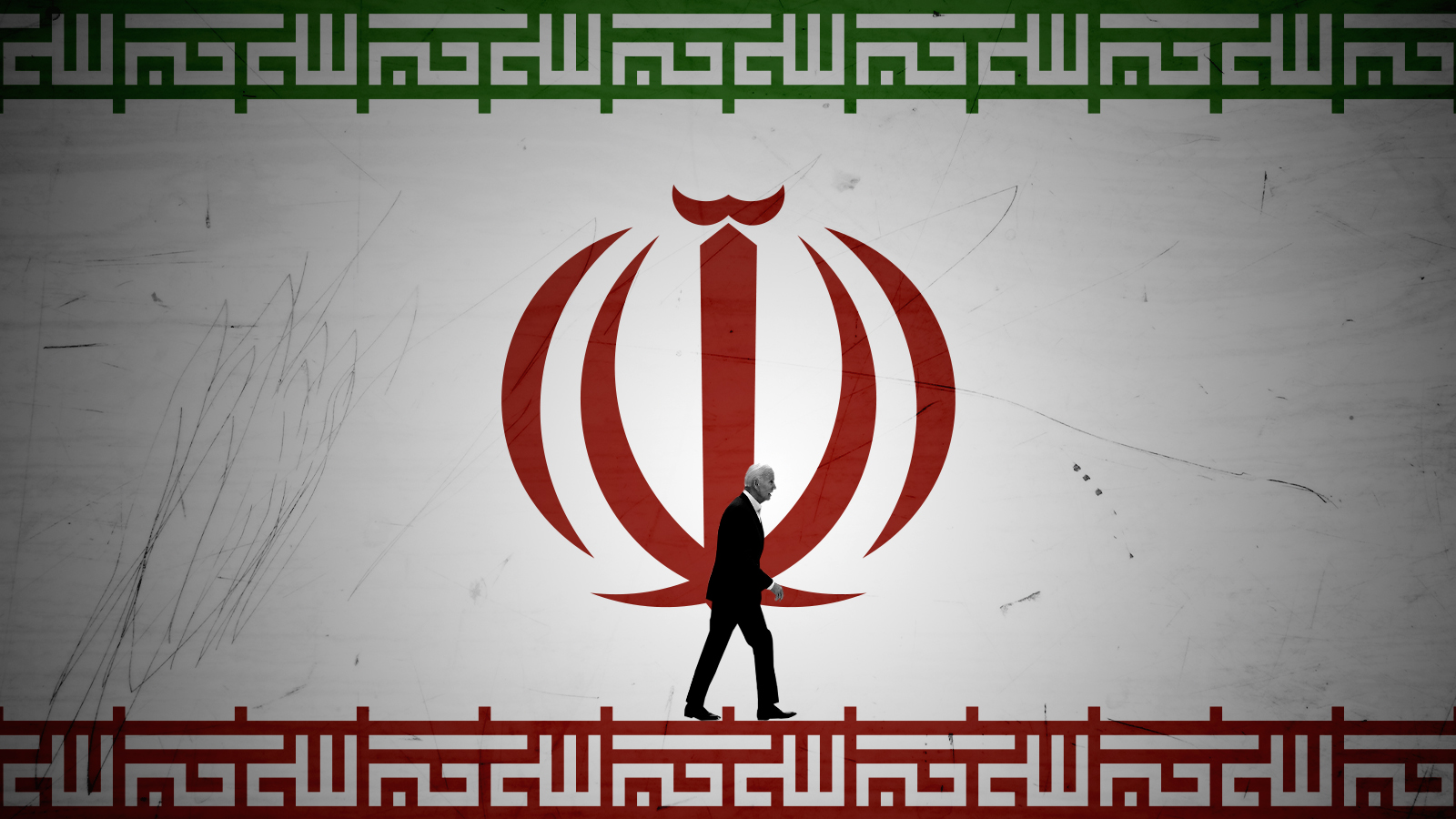Biden needs a new strategy for Iran
America's credibility with Iran has crumbled. Meanwhile, the nation is edging closer to building a nuclear weapon.


A free daily email with the biggest news stories of the day – and the best features from TheWeek.com
You are now subscribed
Your newsletter sign-up was successful
Are we on the precipice of another Iran crisis? More than three years after former President Donald Trump torched the Iran nuclear deal for no particular reason, Tehran is now only weeks or months away from having enough fuel to build a weapon. If President Biden is interested in an outcome other than Iran testing a nuclear weapon, which would represent a monumental failure of American policy across five administrations, he needs to rethink the basic parameters of the negotiations that may soon take place in Vienna.
The Biden administration must first confront severely damaged American credibility. Iran was in full compliance with the terms of the 2015 Joint Comprehensive Plan of Action when Trump petulantly withdrew from the pact — which limited Iranian enrichment activities in return for sanctions relief — and imposed harsh new sanctions. Whether Trump's plan was to trap the next Democratic administration in an impossible, politically toxic bind, carry out an emotionally satisfying act of retaliation against former President Barack Obama, or indulge the D.C. foreign policy blob's fantasy of overthrowing the Iranian regime is known only to the Mar-a-Lago's most famous resident.
Trump's gambit failed predictably and spectacularly, because there was never a plan for what would happen next. Beltway hawks assumed the regime would come crawling back to the table and accept less than they secured in 2015. They did not, especially because Trump's maneuver destroyed any trust that Iranian elites had in the United States.
The Week
Escape your echo chamber. Get the facts behind the news, plus analysis from multiple perspectives.

Sign up for The Week's Free Newsletters
From our morning news briefing to a weekly Good News Newsletter, get the best of The Week delivered directly to your inbox.
From our morning news briefing to a weekly Good News Newsletter, get the best of The Week delivered directly to your inbox.
It's quite the mess that the Biden team inherited, but a new agreement will not be easy to put together. Put yourself in the shoes of new Iranian President Ebrahim Raisi. What benefit could there possibly be to returning to some tweaked version of the Iran Deal?
For starters, Trump himself is lurking in the background, threatening to run for the GOP nomination again in 2024, and if he or anyone like him were to be elected president, they would almost certainly torpedo any new agreement brokered by Biden. No sane leader would subject their country to such monumental uncertainty, particularly when the collapse of the last deal led to enormous economic hardship in Iran and left it deeply unprepared for the pandemic. Dealing with America these days is the diplomatic equivalent of taking out an adjustable-rate mortgage.
Having endured the crippling economic pressure applied by the U.S. and its allies, what else could Raisi have to fear from the United States? For nearly 20 years, American leaders have warned that "all options are the table." With near-celestial reliability, the U.S. is rumored to be on the verge of a bombing campaign, or signals that it will not stand in the way of an Israeli strike on Iran's nuclear facilities. And yet no leader in either country has resorted to such drastic moves, even as the hour of Iran's nuclear breakout draws ever nearer.
It's not just that the threat of force itself is empty. Tehran doesn't operate in some kind of information vacuum — they just watched along with everyone else as the United States withdrew its forces from Afghanistan, as part of a plan negotiated by a Republican president and then carried out by a Democratic one. Staying out of complicated military entanglements in the region is now one of the closest things Washington has to a bipartisan consensus on anything. Secretary of State Anthony Blinken can say whatever he wants, but it is farcical to think that anyone in Iran believes the U.S. has the appetite for anything other than haplessly firing off some cruise missiles in a snit.
A free daily email with the biggest news stories of the day – and the best features from TheWeek.com
The Islamic Republic has survived decades of U.S. scheming as well as material hardships shared by nearly the whole population. With each spasm of protest against brutality, corruption, and ineptitude, hopes are raised that this noxious regime will be washed away, only to be dashed against the brutal rocks of authoritarian resilience. Having suffered so much on the road to a nuclear weapon, now so tantalizingly close that they can practically smell the fallout, why would they stop without major concessions?
These realities demand an entirely new negotiating paradigm. The Biden team first needs to let go of the fantasy of a better Iran Deal, and clear out any dead-enders in the foreign policy team who believe the regime is one push away from crumbling. Thanks to the Trump administration's mindless blundering, Tehran is, in almost every conceivable way, in a stronger bargaining position today than it was in 2015, with even less incentive to believe American promises.
That means that if Iran is to halt work on its nuclear program and resume intrusive international inspections, it must have guarantees from some entity other than the United States that the country will not be plunged right back into economic immiseration even if it is in compliance with whatever terms it agrees to. Most importantly, the U.S. must make a binding promise not to use its power in the global financial and banking systems to bully other countries into not doing business with Iran.
Unfortunately, it is not clear that anyone in the White House sees things this way. Shortly after his inauguration, Biden refused Tehran's bid to restore the pre-Trump status quo, insisting that Iran come back into full compliance before the U.S. rejoins the pact and lifts sanctions. Tehran, understandably, balked at having to make the first move toward rapprochement after the Trump administration walked away from the deal on the flimsiest of pretexts. Maybe they thought outgoing Iranian President Hassan Rouhani no longer had the power to negotiate a binding agreement, which is not unreasonable. But it was disappointing, to say the least, to see the new Democratic administration pass up the opportunity without even trying.
Then in June, pre-ordained election results engineered by Iran's authoritarian rulers brought Raisi, a far more conservative and hawkish figure than Rouhani, to power. Raisi reportedly does not regard getting back into the JCPOA as a top-tier priority, preferring instead to rebuild the economy by deepening ties with Russia, China, and other regional countries. His faction distrusts the United States so thoroughly that negotiations, if indeed they happen, are going to be slow-going and painful.
Yet instead of rethinking its approach, the Biden administration is apparently intent on tying any new nuclear framework to other changes in Iranian policy, such as dismantling the country's missile program. That's a non-starter for Iran, and surely Biden knows it. Perhaps Washington believes Iran is years away from perfecting a weapon design and is content to drop the crisis into the lap of the next administration. Or perhaps they have concluded that they don't care that much whether Iran develops a nuclear weapon after all — a long overdue assessment but one that would not be publicly well received.
Yet any move toward nuclear breakout by Iran will cause absolute political mayhem in the U.S., making the hysterical reaction to the withdrawal of Afghanistan look calm and measured. If the president wishes to avoid that outcome, time is very much running out.
David Faris is a professor of political science at Roosevelt University and the author of "It's Time to Fight Dirty: How Democrats Can Build a Lasting Majority in American Politics." He's a frequent contributor to Newsweek and Slate, and his work has appeared in The Washington Post, The New Republic and The Nation, among others.
-
 Political cartoons for February 7
Political cartoons for February 7Cartoons Saturday’s political cartoons include an earthquake warning, Washington Post Mortem, and more
-
 5 cinematic cartoons about Bezos betting big on 'Melania'
5 cinematic cartoons about Bezos betting big on 'Melania'Cartoons Artists take on a girlboss, a fetching newspaper, and more
-
 The fall of the generals: China’s military purge
The fall of the generals: China’s military purgeIn the Spotlight Xi Jinping’s extraordinary removal of senior general proves that no-one is safe from anti-corruption drive that has investigated millions
-
 The ‘mad king’: has Trump finally lost it?
The ‘mad king’: has Trump finally lost it?Talking Point Rambling speeches, wind turbine obsession, and an ‘unhinged’ letter to Norway’s prime minister have caused concern whether the rest of his term is ‘sustainable’
-
 The billionaires’ wealth tax: a catastrophe for California?
The billionaires’ wealth tax: a catastrophe for California?Talking Point Peter Thiel and Larry Page preparing to change state residency
-
 Bari Weiss’ ‘60 Minutes’ scandal is about more than one report
Bari Weiss’ ‘60 Minutes’ scandal is about more than one reportIN THE SPOTLIGHT By blocking an approved segment on a controversial prison holding US deportees in El Salvador, the editor-in-chief of CBS News has become the main story
-
 Memo signals Trump review of 233k refugees
Memo signals Trump review of 233k refugeesSpeed Read The memo also ordered all green card applications for the refugees to be halted
-
 Has Zohran Mamdani shown the Democrats how to win again?
Has Zohran Mamdani shown the Democrats how to win again?Today’s Big Question New York City mayoral election touted as victory for left-wing populists but moderate centrist wins elsewhere present more complex path for Democratic Party
-
 Millions turn out for anti-Trump ‘No Kings’ rallies
Millions turn out for anti-Trump ‘No Kings’ ralliesSpeed Read An estimated 7 million people participated, 2 million more than at the first ‘No Kings’ protest in June
-
 Democrats: Harris and Biden’s blame game
Democrats: Harris and Biden’s blame gameFeature Kamala Harris’ new memoir reveals frustrations over Biden’s reelection bid and her time as vice president
-
 ‘We must empower young athletes with the knowledge to stay safe’
‘We must empower young athletes with the knowledge to stay safe’Instant Opinion Opinion, comment and editorials of the day
